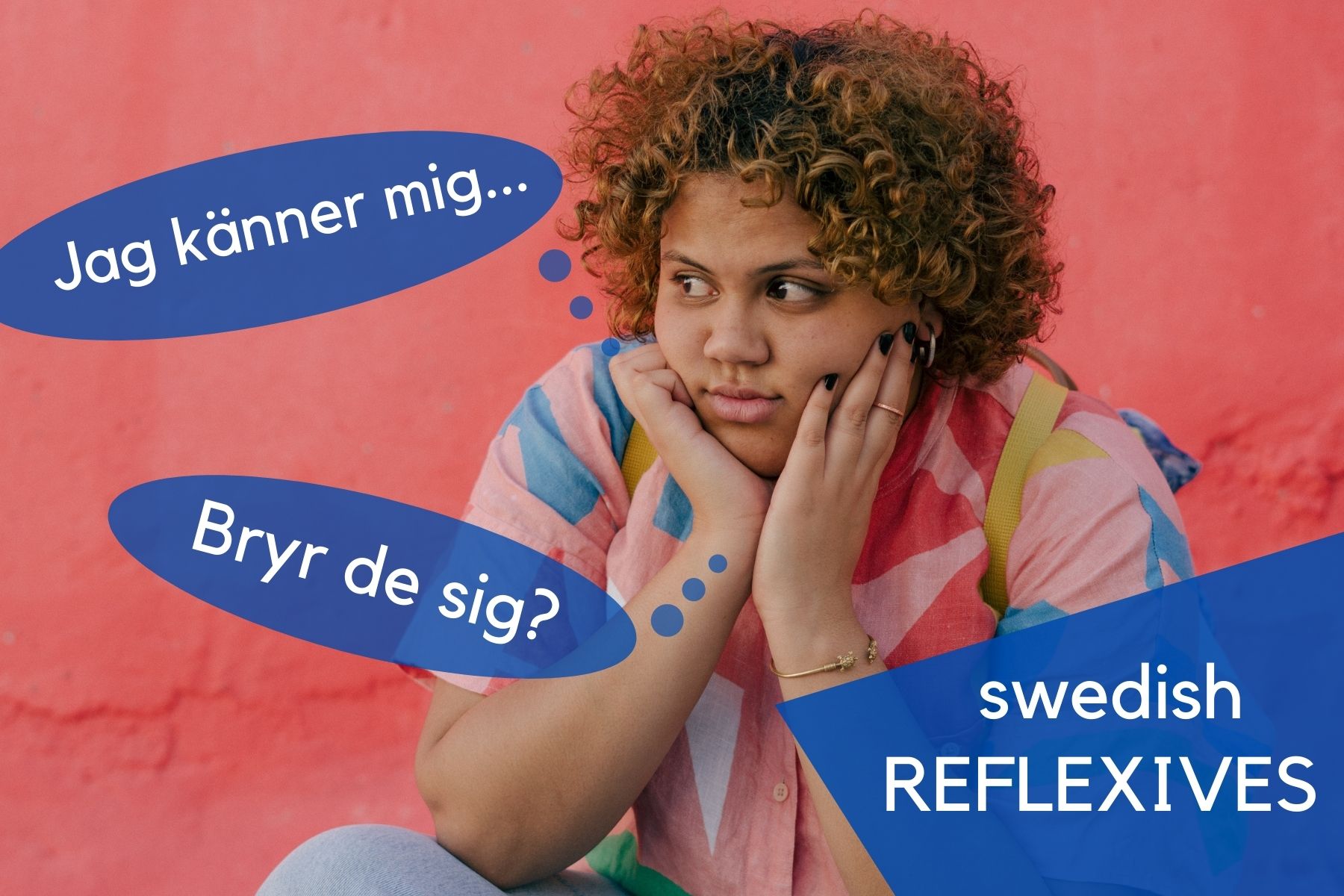Refresh your Swedish Reflexive Verbs and Pronouns Posted by Chelsea B on Sep 10, 2021 in Culture, Swedish Language, Vocabulary
To understand reflexive verbs, start by thinking about activities where the action reflects back on its subject. For example, “I’ll behave myself.” “He’ll shave himself,” and so on. In Swedish we pair even more verbs with a reflexive pronoun – the verb “to learn” is reflexive, “to concentrate” is reflexive, too! In this post, we’ll review the use of reflexive pronouns and cover 11 Swedish reflexive verbs with examples. Don’t skimp on this grammar concept! I find that most Swedish students make mistakes using these verbs.
Svenska reflexiva pronomen / Swedish Reflexive Pronouns
English uses myself, yourself, her/him/themselves, oneself, etc. to denote that a subject is performing an action on its own. “I’ll wash myself.” versus “I’ll wash it.”
In Swedish, we also use a reflexive pronoun to make this distinction. Luckily, we don’t have to learn a whole new set of pronouns because they are the same as the Swedish object pronouns.
| subject pronoun | object pronoun | reflexive pronoun |
|
jag |
mig | myself |
|
du |
dig |
yourself |
|
han/hon/hen |
sig | himself/herself/themself |
| det/den | sig |
itself |
|
vi |
oss | ourselves |
|
|
|
| de | sig |
themselves |
Svenska reflexiva verb / Swedish Reflexive Verbs
Lär sig is the verb for “to learn” in Swedish. It’s made up of the verb lär and a reflexive pronoun. Jag lär mig finska translates to “I am learning Finnish.” When using the verb, select the object pronoun that corresponds to the subject. Refer to the chart above for help!
Han lär sig finska. He is learning Finnish.
Vi lär oss finska. We are learning Finnish.
Now, I want to make the distinction that just because lär sig is a reflexive in Swedish doesn’t mean we translate it to “I learn myself Finnish,” because that just sounds silly, right?
If you’re teaching yourSELF Finnish, you would add the emphasizing word själv to this sentence, Jag lär mig själv svenska, “I am teaching myself Swedish.”
Again, reflexive actions are broken down differently in many European languages so these can be especially hard for native English-speakers.
11 Swedish Reflexive Verbs and their Conjugations
Below, I’ll provide an example of a verb, its conjugations, and an example sentence. We’ll cover question form, and how to negate using reflexives, too! Where does the inte go, you ask? Let’s find out!
att lära sig to learn
lär sig → lärde sig → har lärt sig
Han lärde sig att baka surdegsbröd under pandemin.
He learned to bake sourdough bread during the pandemic.
att vaccinera sig to get vaccinated
vaccinerar sig → vaccinerade sig → har vaccinerat sig
Folk vaccinerar sig för att undvika bli sjuka med covid-19.
People get vaccinated to avoid getting sick with Covid-19.
att koncentrera sig to concentrate
koncentrerar sig → koncentrerade sig → har koncentrerat sig
*Negation alert! Inte goes after the verb and reflexive pronoun
Barnen koncentrerade sig inte på läraren.
The children did not concentrate on the teacher.
att skynda sig to hurry
skyndar sig → skyndade sig → har skyndat sig
Ni måste skynda er! Annars kommer ni att missa tåget!
You must hurry! Otherwise, you’ll miss the train.
att ångra sig to regret
ångrar sig → ångrade sig → har ångrat sig
*Question form:
Ångrar hon sig?
Does she regret (it)?
att klä sig to get dressed / wear
klär på sig → klädde på sig → har klätt på sig
Ungdomarna klär sig som det är 90-talet igen.
Young people dress like it’s the 90s again.
att känna sig to feel
känner sig → kände sig → har känt sig
De känner sig trötta efter en lång vandringsdag i Norrbotten.
They feel tired after a long day of hiking in Norrbotten.
att bry sig to care
bryr sig → brydde sig → har brytt sig
*Question form AND negative:
–Bryr du dig? –Do you care?
-Nej, jag bryr mig inte. -Do. I do not care.
att gå och lägga sig to go to bed
går och lägger sig → gick och la(de) sig → har gått och lagt sig
-Ska vi titta på ett avsnitt till? -Shall we watch one more episode?
-Nej, jag ska gå och lägga mig. -No, I am going to go to bed.
att gifta sig to get married
gifter sig → gifte sig → har gift sig
Ska vi gifta oss?
Shall we get married?
There you have it! A reflexive refresher. I recommend spending more time on these reflexives than you think you need. In everyday usage, you need to think about the proper conjugation of your verb AND assigning the correct reflexive pronoun. The more practice, the better!

Build vocabulary, practice pronunciation, and more with Transparent Language Online. Available anytime, anywhere, on any device.





Comments:
Viva:
Hello Chelsea,
Thank you for all your posts.
Reading them revives my willingness to learn Swedish.
How did you learn pronunciation?
I cannot pronounce that själv and avoid this H sounds.
Thank you.